- Home
- Editorial
- News
- Practice Guidelines
- Anesthesiology Guidelines
- Cancer Guidelines
- Cardiac Sciences Guidelines
- Critical Care Guidelines
- Dentistry Guidelines
- Dermatology Guidelines
- Diabetes and Endo Guidelines
- Diagnostics Guidelines
- ENT Guidelines
- Featured Practice Guidelines
- Gastroenterology Guidelines
- Geriatrics Guidelines
- Medicine Guidelines
- Nephrology Guidelines
- Neurosciences Guidelines
- Obs and Gynae Guidelines
- Ophthalmology Guidelines
- Orthopaedics Guidelines
- Paediatrics Guidelines
- Psychiatry Guidelines
- Pulmonology Guidelines
- Radiology Guidelines
- Surgery Guidelines
- Urology Guidelines
Closure Not Recommended for People with Heart Defect and Stroke: American Academy of Neurology

An updated recommendation from the American Academy of Neurology (AAN) states that catheter-based closure should not be routinely recommended for people who have had a stroke and also have a heart defect called a patent foramen ovale (PFO), a channel between the top two chambers in the heart. The practice advisory, which updates a previous AAN guideline, is published in the July 27, 2016, online issue of Neurology®, the medical journal of the American Academy of Neurology.
To develop the advisory, researchers reviewed all available scientific studies on people with PFO who also had an ischemic stroke, which is a stroke caused by a blood clot, or a transient ischemic attack, which is an episode of temporary stroke symptoms.
"Compared with other ways to prevent a second stroke, such as medications to reduce blood clots, the devices used to close a patent foramen ovale have limited evidence to support their use," said practice advisory author Steven R. Messé, MD, with the Perelman School of Medicine at the University of Pennsylvania in Philadelphia and a Fellow of the American Academy of Neurology. "It's still uncertain how effective these devices are in reducing stroke risk, and the procedure is associated with uncommon but potentially serious complications."
In addition, Messé noted that the devices used for PFO closure are not available for routine use in the United States, so the procedure must be done off-label with a device approved for treating a similar heart defect or with another device that does not have strong evidence regarding its use. At the time of publication, the US Food and Drug Administration is currently reviewing the one device that has the best evidence regarding closure.
"People should know that having a PFO is common-one in four people have one-and the risk of having a second stroke is low," Messé said.
When the AAN developed the earlier guideline on this topic in 2004, not enough evidence was available to make a recommendation on whether closing a PFO was effective in reducing stroke risk.
The advisory also recommends that aspirin or other anti platelet drugs be used to prevent blood clots instead of anticoagulant drugs such as warfarin and heparin, also known as blood thinners, unless there is another reason to use blood thinners, such as a person with a history of blood clots in the legs or lungs.
The practice advisory was supported by the American Academy of Neurology.
The American Academy of Neurology, an association of 30,000 neurologists and neuroscience professionals, is dedicated to promoting the highest quality patient-centered neurologic care. A neurologist is a doctor with specialized training in diagnosing, treating and managing disorders of the brain and nervous system such as Alzheimer's disease, stroke, migraine, multiple sclerosis, concussion, Parkinson's disease and epilepsy.

Disclaimer: This site is primarily intended for healthcare professionals. Any content/information on this website does not replace the advice of medical and/or health professionals and should not be construed as medical/diagnostic advice/endorsement or prescription. Use of this site is subject to our terms of use, privacy policy, advertisement policy. © 2020 Minerva Medical Treatment Pvt Ltd